We get this question all the time: “I’m a licensed nurse in NJ. Can I smoke weed off the clock?”
Because even though the state says lighting up is legal, your employer, the Board of Nursing, and Uncle Sam might have other plans. One puff in your backyard could still raise red flags at work, especially if you’re in a “safety-sensitive” role or work for a hospital tied to federal dollars (hello, Medicare).
So before you spark that joint or pop that gummy, let’s walk through:
- What NJ laws really say (and what they don’t)
- How hospitals, HR, and the Board of Nursing see cannabis
- What counts as “impairment”, and who gets to decide
- What protections you actually have as a nurse in Jersey
- How to keep your license, your job, and your peace of mind
What the Law Says: NJ Cannabis Protections for Nurses
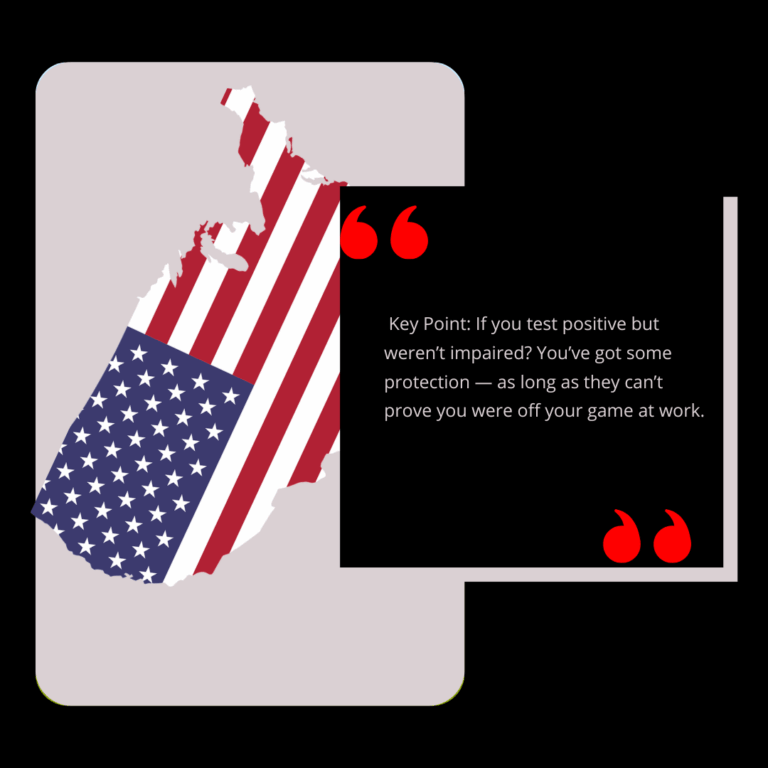

So, what’s actually on the books in Jersey when it comes to nurses and cannabis? Two key laws set the stage: CREAMMA and the Jake Honig Compassionate Use Act.
CREAMMA: The “Yes, But…” Law for Off-Duty Use
The Cannabis Regulatory, Enforcement Assistance, and Marketplace Modernization Act (aka CREAMMA) is the big one. It says:
- Employers can’t punish you just for using cannabis off the clock.
- A positive THC test alone isn’t grounds for discipline.
- BUT, if you’re impaired at work? That’s a wrap.
Here’s the kicker: many nursing jobs are considered “safety-sensitive.” Think: handling meds, patient care, emergencies. So even if you’re not high on shift, employers can still enforce stricter standards based on job risk.
The Jake Honig Act: Extra Cover If You’re a Medical Patient
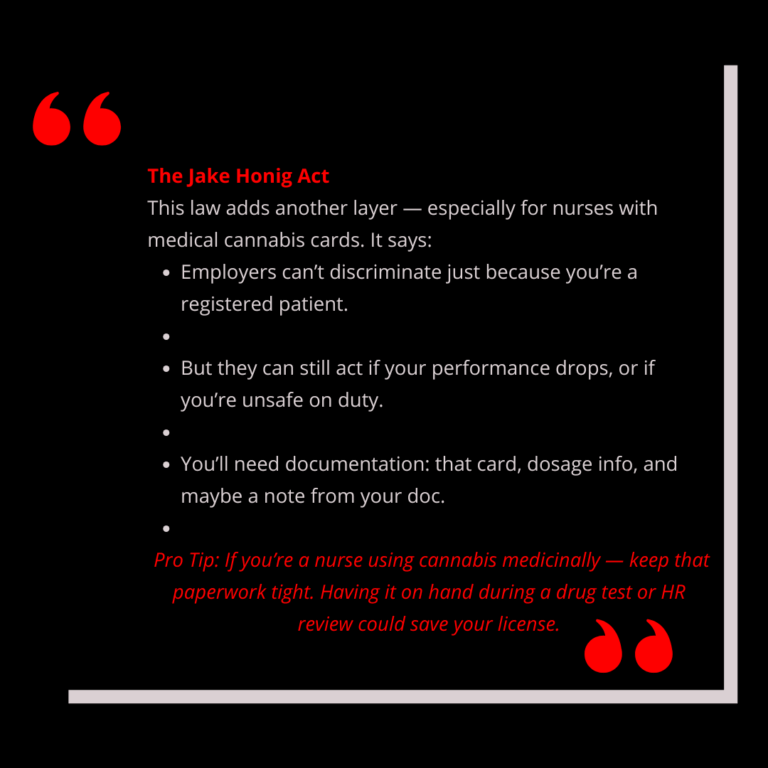

This law adds another layer, especially for nurses with medical cannabis cards. It says:
- Employers can’t discriminate just because you’re a registered patient.
- But they can still act if your performance drops, or if you’re unsafe on duty.
- You’ll need documentation: that card, dosage info, and maybe a note from your doc.
WIRE: The “Proof of Impairment” Rule
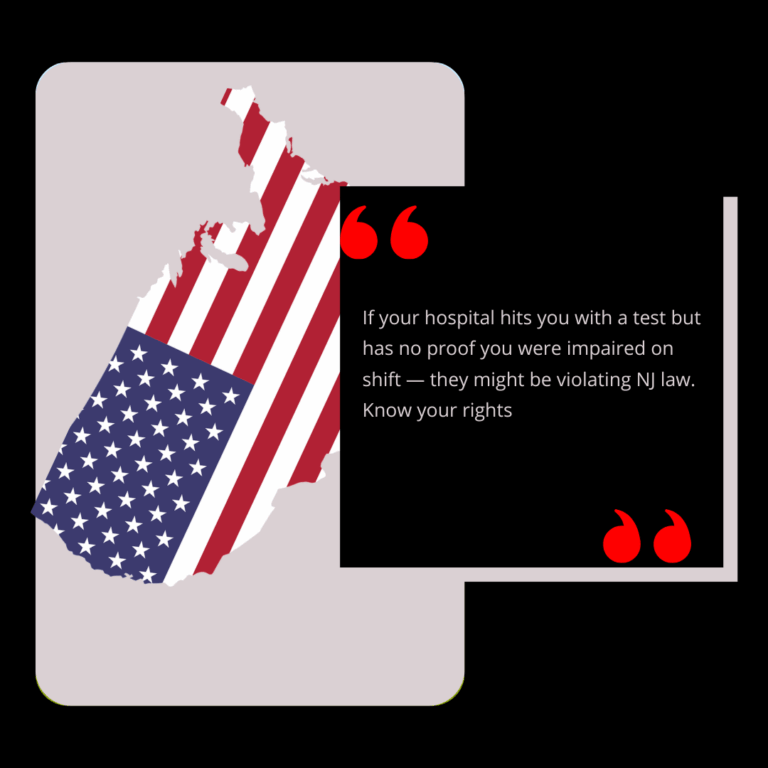

New Jersey doesn’t want workplaces firing folks over a weekend blunt. That’s where WIRE comes in, short for Workplace Impairment Recognition Expert.
This rule means:
- Employers need someone trained to spot actual impairment, slurred speech, unsteady hands, weird behavior.
- A failed urine test isn’t enough. They need a written observation to back it up.
But Hold Up, The Fine Print That Trips Folks Up
Here’s where it gets messy:
- Hospitals that take federal funding (Medicare, Medicaid) can ignore state protections and enforce zero-tolerance.
- Most nurse roles are still “safety-sensitive,” so stricter drug policies are often baked into contracts.
- Some hospitals require pre-employment testing or random screening, even when not legally required.
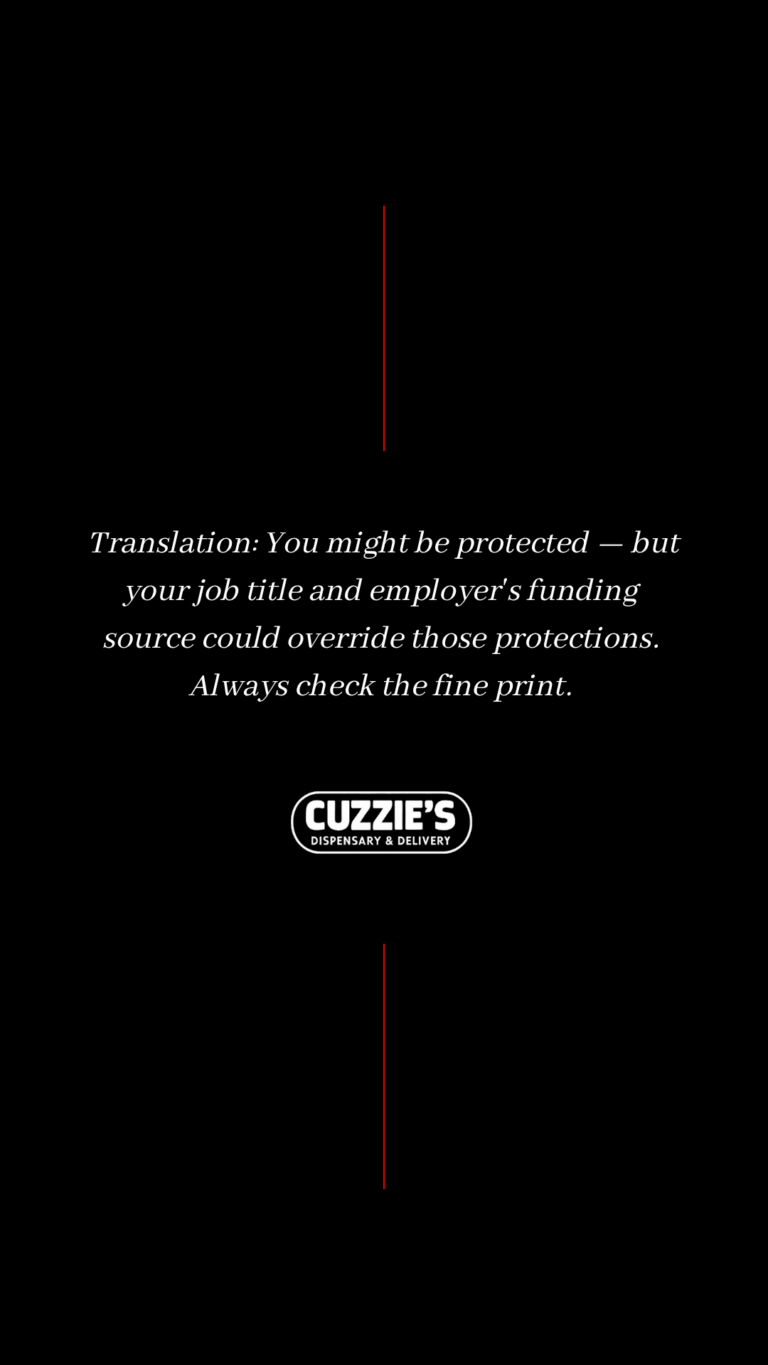

What NJ Hospitals Actually Do: Policies, Testing, and Reality Checks
Sure, state law says one thing. But what really happens when nurses use cannabis off the clock? Let’s talk policies, testing, and how it all plays out inside New Jersey healthcare facilities.
Drug Testing Is Still a Thing, Big Time
Even in 2025, most hospitals in NJ still run drug screens. Common testing scenarios include:
- Pre-employment testing, yep, still standard for most roles.
- Post-incident testing, any workplace accident or error often triggers a test.
- Reasonable suspicion, if your behavior’s off, HR might send you for screening.
- Return-to-duty tests, after a leave or disciplinary action.
- Random testing, less common, but still happens in high-risk units or union contracts.
Real Talk: Even if you’re off-duty and compliant, these tests can still mess with your job, especially since THC can show up weeks after use.
The “Zero-Tolerance” Loophole
Some hospitals, especially those tied to federal money, still enforce zero-tolerance policies. They’ll cite:
- Medicare/Medicaid compliance
- Insurance liability clauses
- “Fitness for duty” standards in HR policies
So even if NJ law says you’re protected from a THC-positive test, your hospital might still have the power to let you go.
And yeah, that’s legal, if they’re playing by federal rules.
What Your Employer Should Tell You (But Might Not)
Too many nurses report getting vague answers when they ask HR about weed. So here’s what you should be asking:
- Do you test for cannabis pre-employment or randomly?
- How do you determine impairment, WIRE-certified staff, written observations?
- Are there special rules for medical cardholders?
- If I test positive but show no signs of impairment, what happens next?
- Is there a required 30-day abstinence window before orientation?
Cuzzie’s Tip: Don’t just ask verbally. Ask for the written drug policy. That’s what HR and legal will follow if things go south.
The Red Flags Nurses Are Seeing on the Ground
Based on what we’ve heard from NJ nurses:
- Some hospitals require random testing every quarter, even with legal weed.
- A few require nurses to report any cannabis use to supervisors, even if off-duty.
- PRN/per diem nurses get tested more often because they’re “floating” between roles.
- One nurse said they were put on leave just for having edibles in their glovebox on hospital grounds.
- Several were flagged after coworkers reported smelling cannabis or seeing dispensary bags.
Your Hospital’s Policy > The Law
Let’s keep it 100, the law might give you protections, but your employer’s policy is what’ll actually affect your paycheck.
Until federal laws change or hospitals rewrite their handbooks, nurses need to move smart, know their contracts, and ask the uncomfortable questions up front.
Can You Lose Your License for Weed? What the NJ Board of Nursing Really Says
You’re a nurse, not just an employee, but a licensed healthcare professional. So even if your hospital doesn’t trip over cannabis, the New Jersey Board of Nursing (NJBON) might. Let’s break down what’s real and what’s rumor.
The Board Doesn’t Ban Weed, But It Does Ban Impairment
Let’s get it straight: the NJBON doesn’t say nurses can’t use cannabis, whether medical or recreational. But what it does say is this:
“Nurses must be fit for duty at all times and provide safe, competent care.”
, NJBON professional standards language”
Translation: you can legally smoke on Saturday night… but if you show up faded on Sunday? That’s a fitness-to-practice violation.
Impairment = Investigation
Here’s when the BON gets involved:
- You’re reported for being “off” on the floor (slurred speech, drowsy, errors).
- A patient or coworker complains.
- A workplace incident occurs, and you test positive.
- Your manager or HR thinks your behavior risks patient safety.
If that happens, NJBON can:
- Launch an investigation.
- Suspend or restrict your license.
- Refer you to RAMP (Recovery and Monitoring Program).
- Require documentation, evaluations, or hearings.
Reminder: It’s not just about THC in your system, it’s about whether you were safe and alert while working.
What About Medical Cannabis Patients?
If you’re using cannabis with a valid NJ medical card, you do have some legal protection under the Jake Honig Act.
But even then:
- You still can’t be impaired at work.
- You might need to submit documentation to HR or occupational health.
- If your usage impacts performance, you’re not protected, even with a card.
Word from the field: Nurses who disclosed their card early on were more likely to avoid disciplinary action, but only if no safety concerns popped up.
Real Worries Nurses Have (And How to Handle Them)
- “Could I lose my license for one failed test?”
If you weren’t impaired and have a clean record, a single THC-positive test might not trigger BON action, but it depends on the situation. - “Do I have to report cannabis use during license renewal?”
As of now, there’s no blanket requirement to disclose legal cannabis use unless you’re under investigation or disciplinary action. But always double-check with NJBON or your attorney. - “Will this go on my BON record forever?”
If there’s an investigation, it could show up in public or internal records, even if you keep your license. That’s why it’s crucial to fight any unsubstantiated claims of impairment.
“Can my union or lawyer help?”
Yes. If you’re accused of impairment, call your union rep or employment attorney immediately. Do not try to talk your way out of it, everything you say can be used against you.
Pro Tip: Stay Professionally Covered
If you use cannabis, especially for medical reasons, protect your career with:
- A copy of your medical card and physician’s recommendation.
- A written log of usage (dose, time, symptoms).
- Clear documentation if you need accommodations.
- Avoiding use before work, even the night before.
It’s Not About the Weed, It’s About the Work
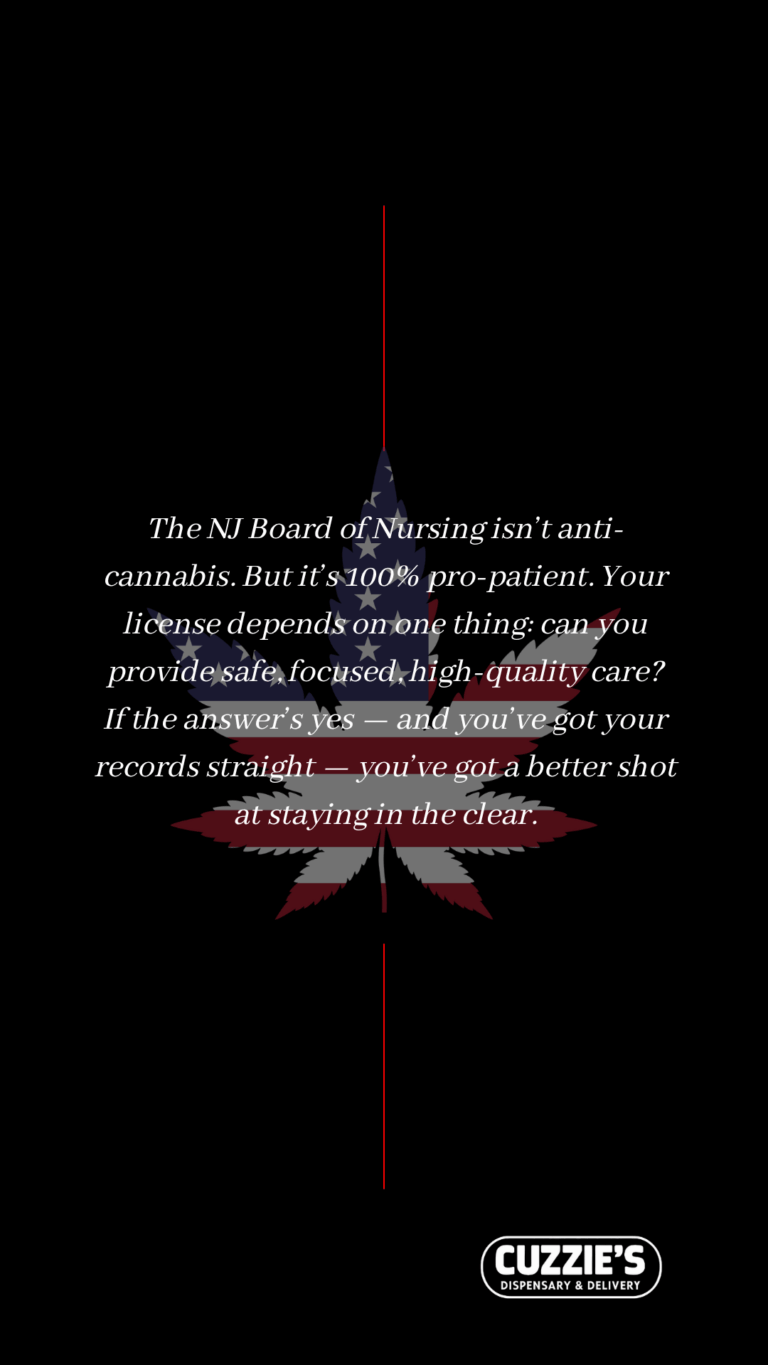

The NJ Board of Nursing isn’t anti-cannabis. But it’s 100% pro-patient. Your license depends on one thing: can you provide safe, focused, high-quality care?
If the answer’s yes, and you’ve got your records straight, you’ve got a better shot at staying in the clear.
What Counts as “Impairment”? (And Why a Positive Test Isn’t Enough in NJ)
You already know THC can sit in your system for weeks. But here’s where New Jersey flips the script: you can’t be punished for a positive test alone, at least, not without something more.
Enter: The WIRE Rule
Thanks to the Cannabis Regulatory Commission’s 2022 guidance, employers in NJ must prove actual impairment, not just THC in your pee, before taking action.
To do that, they need a Workplace Impairment Recognition Expert (WIRE) or someone similarly trained to document:
- Slurred speech
- Unsteady gait
- Memory lapses or confusion
- Odd or unsafe behavior
- Decreased motor skills
- Repetitive errors
This trained observer must file a formal report before any disciplinary move tied to cannabis use can legally stick (unless federal law overrides it).
What This Means for Nurses
If your hospital isn’t federally contracted (and you’re not in a safety-sensitive role like EMS transport), here’s how the WIRE law protects you:
- You fail a random test → Hospital can’t fire you just for THC.
- You’re acting “off” → They need a WIRE to observe and document behavior.
- No impairment observed → They can’t act on the test alone.
Important Caveat: Hospitals can still fire or discipline if they have a federal tie-in or declare your job “safety-sensitive.” In those cases, they may not follow CRC guidance, and courts have upheld those carve-outs.
Nurses Are Still at Risk If…
- They’re impaired at work (WIRE or not).
- Their job is federally funded (Medicare/Medicaid, VA, etc.).
- They work in safety-sensitive areas like ERs, psych wards, or surgical units.
- They admit to cannabis use publicly or in paperwork, then get flagged.
Drug Test ≠ Impairment (And That’s Backed by Science)
Unlike alcohol, there’s no test that says “this person is high right now.” So:
- Urine = THC up to 30 days
- Saliva = 1–3 days
- Hair = 90+ days
- Blood = short window, but rarely used
A good WIRE program knows this. A lazy HR department might ignore it.
Best Practices: Protecting Yourself Under the WIRE System
- Don’t use cannabis before a shift, even the night before.
- Keep records of your medical card, doctor’s recs, and usage times.
- If tested, ask for a second test (blood or saliva) and a copy of the WIRE report.
- Challenge any action taken without formal impairment documentation, especially if you weren’t behaving abnormally.
Final Word on WIRE: It’s a Shield, Not a Get-Out-of-Jail Card
The WIRE law is a powerful layer of protection, but it only works if you weren’t actually impaired at work.
Still, it gives you the right to fight back if an employer tries to fire you based on old-school “you peed hot, you’re gone” rules.
What Nurses Really Face in NJ Hospitals: Drug Tests, HR Grey Areas & Policy Loopholes
Let’s keep it a buck, just because the law changed doesn’t mean every hospital got the memo.
Despite NJ’s progressive rules, many nurses still deal with outdated drug policies, inconsistent enforcement, and real fear about using cannabis, even off the clock.
Common Drug Testing Scenarios Nurses Encounter
Even with state protections in place, here’s how drug testing still shows up in Jersey healthcare:
- Pre-employment: Most hospitals still screen before hiring, and a positive result can tank your offer, even if you’re carded.
- Random testing: Rare, but it happens. Some union nurses report once-a-quarter randoms.
- Post-incident: Any mistake, patient fall, medication error, needle stick, can trigger immediate testing.
- “Reasonable suspicion”: If a manager thinks you’re acting odd, they can request a test + WIRE eval.
- Return-to-duty: Coming back from medical leave or mental health break? You might be asked to test.
⚠️ Employer Policy ≠ State Law
Just because CREAMMA says employers need WIRE documentation doesn’t mean your hospital agrees. Many still operate like it’s 2014.
Here’s what we’ve seen in NJ healthcare settings:
- Zero-tolerance still listed in official handbooks.
- Policies that ban all use within 30 days of starting work,even if they don’t test.
- No mention of WIRE at all, even though it’s required under NJ law.
- Contract clauses that make you waive cannabis use entirely, especially for per diem or PRN roles.
What Nurses Should Always Ask HR (Before It’s Too Late)
You gotta protect your bag, and that means getting clarity on paper. Here’s what you need to ask:
- “What’s the exact policy on cannabis use for licensed staff?”
- “Do you follow CRC WIRE guidelines when testing?”
- “Is pre-employment or random testing still required?”
- “Do you treat medical cardholders differently?”
- “Is impairment defined by test results or behavior?”
And if they act shady? Request a written policy or handbook. If they won’t give it, that’s your answer right there.
Pro Tip: Review These Documents
Before your first day, or ASAP if you’re already employed, read:
- Your employee handbook
- Union agreements, if you’re represented
- Any Occupational Health policy memos
- HR onboarding materials (especially anything you signed)
Don’t Assume “It’s Legal” = “You’re Safe”
NJ law tries to help. But hospitals tied to federal grants (Medicare, Medicaid, VA) often opt out of state protections and follow federal guidelines, which still classify weed as a Schedule I drug.
Summary: Know Your Employer. Know the Paper Trail.
- Even with CRC guidance, hospitals can, and do, set stricter rules.
- You have rights, but only if the employer is subject to state law and follows it.
- Never rely on assumptions. Always get the facts in writing.
Can Weed Use Cost You Your Nursing License in NJ? Here’s What the Board Says
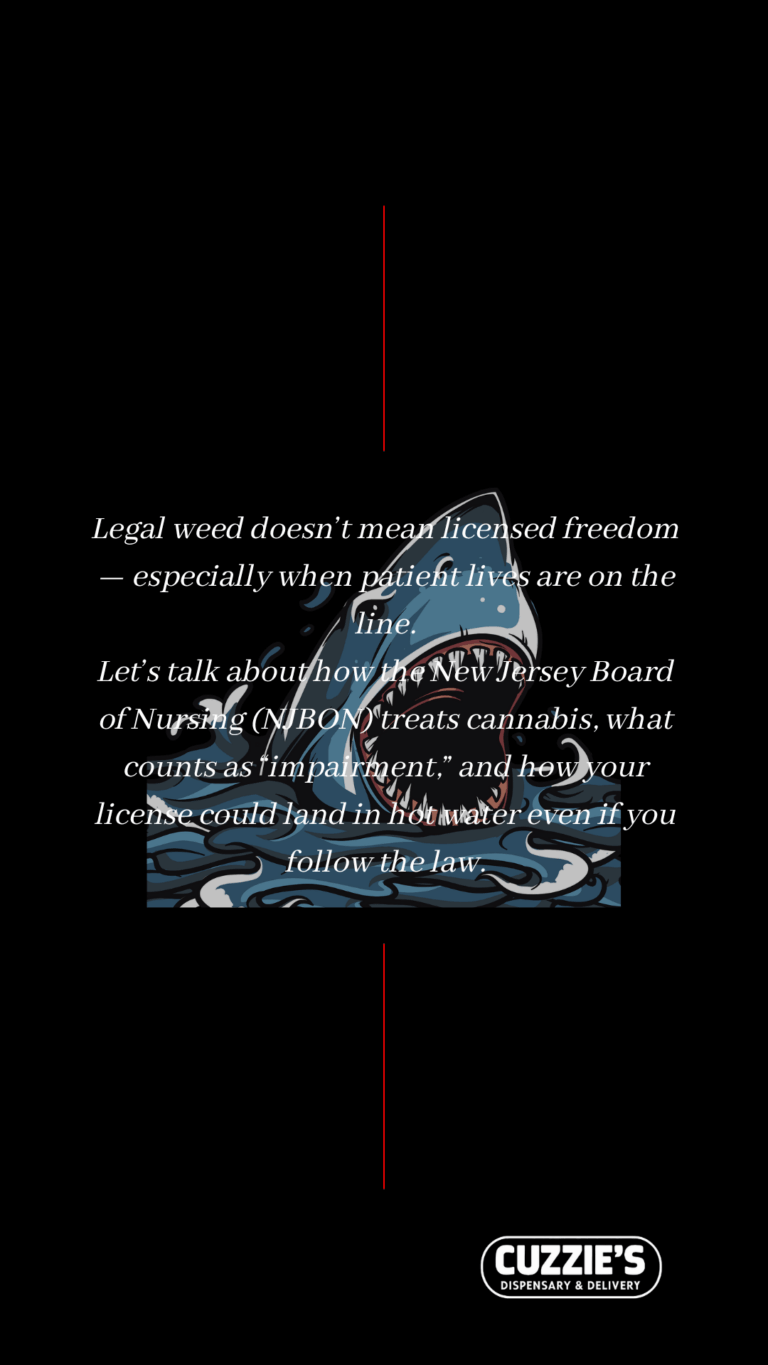

Legal weed doesn’t mean licensed freedom, especially when patient lives are on the line.
Let’s talk about how the New Jersey Board of Nursing (NJBON) treats cannabis, what counts as “impairment,” and how your license could land in hot water even if you follow the law.
NJBON’s Real Stance on Cannabis Use
The NJ Board of Nursing doesn’t outright ban weed, but here’s the truth:
- They require “fitness for duty” at all times.
- If you show up high, or they think you did, they’ll investigate.
- A single positive test + concerning behavior = review.
- If patient care is affected, you’re looking at discipline, license probation, or even suspension.
What Triggers an NJBON Investigation?
Any combo of these:
- Slurred speech or coordination issues on shift
- Complaints from coworkers or patients
- Failed or refused drug test
- Social media posts implying cannabis use
- Possession of cannabis products on hospital grounds
Even if you weren’t impaired, a strong enough report can trigger action.
The RAMP Program: Rehab or Reputation Killer?
If the NJBON suspects substance use, they may refer you to RAMP (Recovery and Monitoring Program).
- Voluntary, but refusal may lead to formal charges
- Involves mandatory treatment, random testing, and work restrictions
- Can last 1–5 years
- May still appear on licensure background checks
Ethical Standards from the ANA & NJSNA
- ANA says nurses must be “cognitively and physically functional” to provide care.
- NJSNA echoes that, supporting medical cannabis rights, but only when impairment isn’t a risk.
Translation? They don’t care if it’s legal, they care if it affects patients.
Is Cannabis Nursing a Real Thing? Yep, and It’s Growing.
The American Cannabis Nurses Association (ACNA) now offers certifications in:
- Cannabis pharmacology
- Patient cannabis education
- Safe use strategies
- Endocannabinoid system science
Some NJ nurses are pivoting into this emerging field, helping patients use cannabis legally and safely, while staying professionally protected.
Your License Is Always on the Line
Here’s how to stay clear:
- Never show up to work impaired, not even “just a little.”
- Don’t keep weed in your car at work.
- Avoid discussing cannabis use at work or online.
- If you’re carded, keep that documentation handy.
- If questioned, don’t talk, lawyer up.
How to Use Cannabis (Legally) Without Risking Your NJ Nursing Career
Being a nurse in NJ while using cannabis, even legally, is like walking a tightrope in Crocs. But there’s a way to stay balanced. Here’s your blueprint for staying compliant, clear-headed, and career-safe.
Best Practices for NJ Nurses Who Use Cannabis
- Never Use Before or During Work, Period: Even if you’re carded, even if it’s just a gummy, impairment on the clock is game over.
- Use Responsibly After Work: Give yourself 8–12 hours before your next shift. THC lingers longer than you think.
- Document Everything: Medical patients: Keep your card, dosage instructions, and physician’s note handy, especially during hiring or HR check-ins.
- Keep It Quiet: Avoid workplace convos about cannabis. Also, clean up your social media, that dispensary selfie could come back to haunt you.
- Know the Products You’re Using: Some CBD products still carry trace THC, enough to trigger a positive test. Only use lab-tested, THC-free options if needed.
If You Test Positive or Are Accused of Being Impaired
Don’t panic, move smart.
- Request a second test, preferably saliva or blood (fresher window than urine).
- Ask to see the impairment report (NJ law requires WIRE or similar observation).
- Call a lawyer or union rep immediately, don’t go solo into HR.
- Submit your medical card and documents (if applicable).
Remember: You’re not legally required to admit to cannabis use unless it’s medically relevant and tied to a positive result.
Why Nurses Trust Cuzzies
Because we’re local. Because we care. And because this brand was built to honor someone who lived his life with loyalty, hustle, and heart, just like every nurse on the night shift.
Cuzzie (yeah, he was real) treated everyone like family. That’s the vibe we bring to every blog, every product, and every customer interaction.
So whether you’re trying to calm your nerves after a 12-hour shift, figure out what “reasonable suspicion” actually means, or just need a no-B.S. answer about your rights, Cuzzies.com is your spot.
Final Word From the Fam
To every nurse out here juggling care, compliance, and cannabis, we see you. And we’ve got you.
Want to enjoy cannabis without putting your license on the line?
Check out Cuzzies.com, we’ve got NJ-specific education, discreet gear, and a whole lot of respect for what you do.
Compassion doesn’t clock out after your shift.
Protect your peace. Stay informed. And keep showing up like the badass professional you are Cuzzies will be right here when you need us.
Disclaimer
This article is for informational purposes only and does not constitute legal advice. Cannabis laws and professional licensing rules vary by employer and change frequently. Nurses should consult their hospital HR, union, or a qualified employment attorney for guidance on cannabis-related employment issues in New Jersey.
